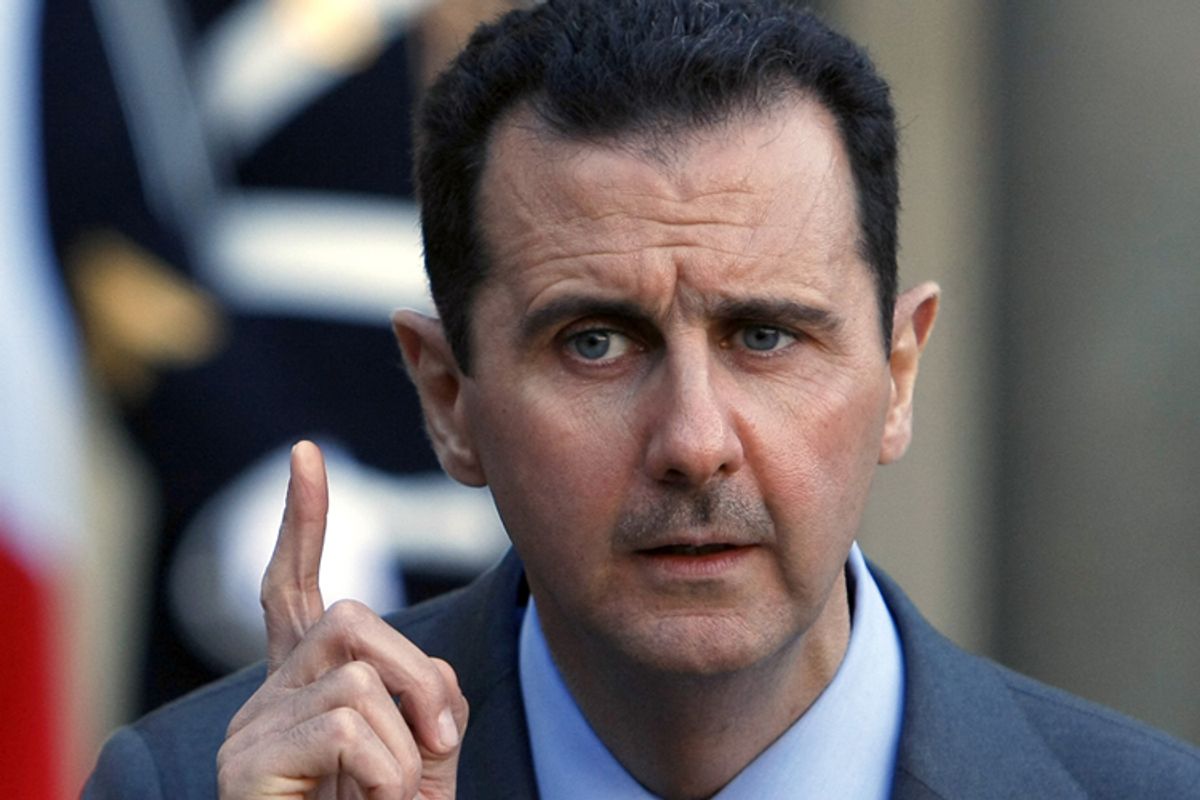BEIRUT (AP) — Syrian warplanes bombed rebel positions near a contested military air base in the north on Tuesday, activists said, while President Bashar Assad's forces nearby pressed ahead with an offensive against opposition fighters in the country's largest city Aleppo.
The Britain-based Syrian Observatory for Human Rights said that fighter jets struck near the Kweiras air base near the Turkish border early Tuesday. Opposition forces fighting to oust Assad's regime for more than two years have been trying for months to take Kweiras and two other military air bases nearby.
Assad's regime has relied heavily in the past year on its air force to neutralize the opposition's territorial gains. In the last year, rebels have been able to capture much of the area near the Turkish border, several districts in Aleppo, the whole city of Raqqa and even dams on the River Euphrates. But they have had difficulty running these areas effectively because of the threat of attack from the air.
The Observatory, which relies on a network of informants inside Syria, also reported heavy clashes in Aleppo, the country's commercial hub.
There were no reports of casualties in either the strikes or the fighting.
The regime announced June 10 that it has launched an offensive in the north with the aim of ousting rebels from Aleppo neighborhoods that the opposition captured last summer.
Assad's army hopes to maintain the momentum from its victory in the town of Qusair, in central Syria, which the regime captured earlier this month largely with the help of Hezbollah, Lebanon's Shiite and Iran-backed militant group.
Hezbollah's involvement in Syria's civil war on the regime's side has deepened sectarian divisions in Lebanon, pitting Shiite and Sunni Muslims against each other in a country with an explosive sectarian mix and still recovering from its own, devastating 15-year civil war that had ended in 1990.
Sunnis dominate the rebel ranks in Syria's civil war and the Assad regime is made up of Alawites, an offshoot sect of Shiite Islam. The conflict's sectarian overtones have increased fears that the fighting between Muslim sects will become a regional war.
Concern that the Syria conflict will spread has prompted the leaders of major economic powers meeting in Northern Ireland to strengthen efforts to bridge divisions over the fighting in Syria. A statement from the Group of Eight is expected Tuesday.
G-8 leaders on Monday dedicated themselves to a political solution to Syria's bloody civil war, even as President Barack Obama and Russian President Vladimir Putin stake out diametrically opposite stands on which side deserves military support.
The U.S. remains committed to Obama's recent decision to arm the rebels and Russia did not budge from its weapons sales to the Damascus regime.
Russia is a staunch ally of Assad's regime and the U.S. and its European and Gulf Arab allies are backing the opposition.
Also on Tuesday, Lebanon's official news agency said unknown gunmen shot and wounded a Syrian man, whom it said was believed to have been involved in a deadly attack on four Shiite youth in Ras Baalbek, a Hezbollah stronghold located in a volatile area near the border with Syria.
The National News Agency did not elaborate on the suspected connection between the attack on the Syrian in the town of Labwa and the killing of four Shiites in a Sunday ambush nearby.
Their deaths hiked already high sectarian tensions, which have sparked concern that the civil war next door will transform sporadic clashes between factions supporting opposing sides in the Syrian conflict into a full blown war inside Lebanon.
The men were from the powerful local Shiite clans of Jaafar and Amhaz, and gunmen from the families fanned out in streets between their hometown Labwa and the nearby Sunni-majority Arsal. The father of one of the killed, Hussein Amhaz, blamed Arsal residents for the attacks. Shiites in the area have accused Sunnis in Arsal people of firing rockets at them in past weeks, but security officials say there is no evidence that is true.
The Syrian uprising began more than two years ago with peaceful protests against Assad, but later grew into a civil war that has killed 93,000 people and probably many more, according to the U.N.



Shares